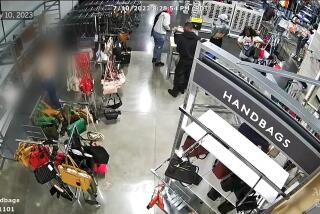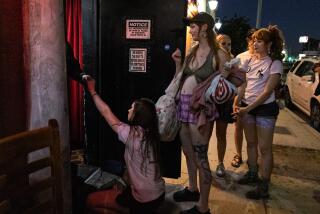Coupon Clubs Try Not to Get Clipped : Charity: Do-gooders can be easily duped into believing that their efforts help worthy causes.
- Share via
For 10 years, Janet Lieber and her Canoga Park Women’s Club mailed tens of thousands of coupons to a San Diego post office box. They thought they were helping to buy guide dogs for the blind.
Then came the lowdown truth: They’d been had by coupon cons.
Instead of contributing to charity, each coupon the women clipped was forwarded to manufacturers in what authorities suspect was a wide-ranging redemption scam.
Every year, such rackets dupe product-makers of about $500 million, ultimately driving up prices to consumers.
And well-meaning clubs unwittingly play a major role: The crooks need volunteers for the laborious coupon clipping, so they place crafty classified ads and wait for unsuspecting do-gooders to take the bait.
Those coupons are then fraudulently redeemed with manufacturers for products never bought. And shysters keep the profit.
“We felt duped, of course,” says Lieber, an 81-year-old former club president. “We were horrified that we were all part of some criminal network.”
Authorities and manufacturers, however, are fighting back.
In 1989, a federal judge in Los Angeles fined two men convicted of coupon fraud $95,000 and directed that the money be used to start a nationwide watchdog group to fight such crimes.
The Coupon Fraud Prevention Project Task Force has sent out hundreds of videotapes to clubs and charities, warning that their involvement in such scams threatens their tax-exempt status. Club members could also be charged with abetting mail fraud, a federal crime.
On the tape, Janet Lieber explains how her club was misled. No arrests have been made in the case, but authorities say the investigation continues.
“The irony,” says Kathryn Clapp, a U.S. probation officer in Los Angeles who chairs the task force, “is that most coupon fraud involves very nice men and women who in their hearts believe they’re donating their time and effort to charity.”
Since the mid-1970s, hundreds of con artists have been arrested for redemption scams. But the Al Capone of coupon fraud was Larry Krasnick, a Florida grocer who established a network of phony stores to unlawfully redeem coupons, bilking manufacturers of more than $44 million before his 1988 arrest in a federal sting.
“This was a very intelligent businessman gone bad,” says Rick Bowden, a U.S. Postal Inspector and coupon task force member. “He found he could make more money redeeming bogus coupons than he could doing business legally.”
Nationwide, a handful of coupon cops--such as Rich Reeves--battle the con artists.
The former Wichita policeman now works for Lee’s Marketing, a St. Louis company that conducts coupon detective work for small-scale product-makers. Some larger manufacturers have their own in-house coupon security czars.
Together, they’ve dreamed up stings that floated coupons for Broach-the-Roach bug killer and Breen detergent--products that didn’t even exist but which resulted in almost 200,000 fraudulent redemptions.
They work from a nationwide list of grocers, making sure that the coupons redeemed are proportionate to the store’s customer volume. When the coupon numbers suddenly jump, they get suspicious.
Once, the 61-year-old Reeves and a U.S. Postal Inspector searched a busy Los Angeles street for a store that had deluged manufacturers with coupons.
Instead, they found a vacant lot at the address given.
Recalls Reeves: “The crooks had created this bogus supermarket as a front to redeem the coupons. We just looked at each other and laughed.”
More to Read
Inside the business of entertainment
The Wide Shot brings you news, analysis and insights on everything from streaming wars to production — and what it all means for the future.
You may occasionally receive promotional content from the Los Angeles Times.











